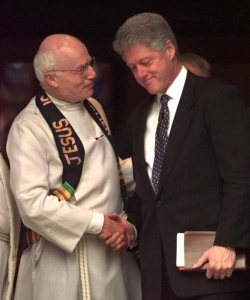
Michael Takiff’s massive new oral biography of President Clinton, “A Complicated Man,” hit the shelves this week. Oddly, despite reporting that Clinton called faith “probably the most important thing in my life,” religion gets precious little attention in the 496-page tome.
Two passages, however, stuck out.
The first is a reminiscence from the Rev. J. Philip Wogaman, former pastor at Washington’s Foundry United Methodist Church, where Bill, Hillary, and Chelsea regularly attended services and Sunday school.
Wogaman says that after the Oklahoma City bombing in 1995, Clinton was “pastor to the nation.” Two Sundays after Clinton’s speech in Oklahoma, Wogaman greeted him at Foundry’s door.
“Mr. President, if, after politics, you are looking for another position, I think you’d make a fine pastor,” Wogaman told Clinton.
The president smiled and said, “I’m not a good enough person.”
Several years later, Wogaman was one of three pastors Clinton turned to for spiritual support during the Lewinsky scandal. (That’s Bill and Phil pictured at Foundry at left.)
The second passage recalls a conversation between Clinton and then-Russian President Boris Yeltsin as the two were having dinner in Yeltsin’s Moscow dacha in 1994. Protestant missionaries were flooding through the new democracy’s doors, Yeltsin complained to Clinton, and the Russian president wanted to turn off the spigot.
Yeltsin asked Clinton if he was a Christian. “Yes, my faith is probably the most important thing in my life,” Clinton answered.
Yeltsin said, “I’ve got to stop these Christians from coming into my country. They’re making converts. People are being baptized. They forget their historic church. The missionaries are destroying our culture.”
Clinton said, “You can’t do that, Boris. In a democracy either you’re free or you’re not. You can’t have it both ways.”
Yeltsin did not close the door to missionaries, according Carol Staley, a lifelong friend of Clinton’s who told Takiff the above anecdote. Since Yeltsin’s time, Russia still hasn’t closed the door to foreign missionaries, but the government, under the influence of the Russian Orthodox Church, has made it very difficult for them to evangelize and practice their faith.




